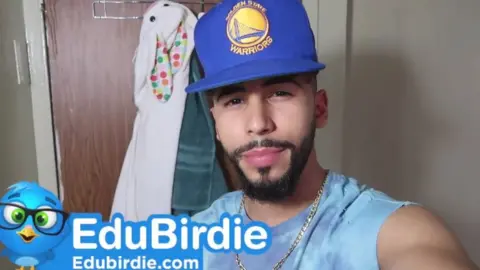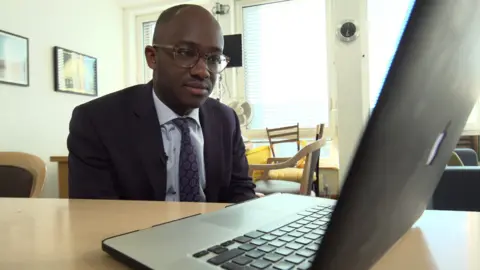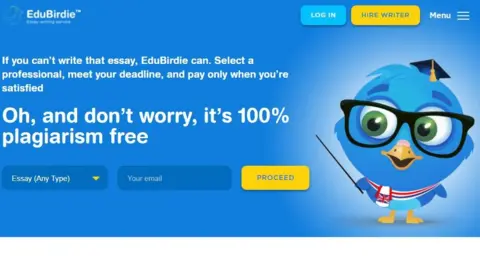The YouTube stars being paid to sell cheating
YouTube stars are being paid to sell academic cheating, a BBC investigation has found.
More than 250 channels are promoting EduBirdie, based in Ukraine, which allows students to buy essays, rather than doing the work themselves.
YouTube said it would help creators understand they cannot promote dishonest behaviour.
Sam Gyimah, Universities Minister for England, says YouTube has a moral responsibility to act.
He said he was shocked by the nature and scale of the videos uncovered by the BBC: "It's clearly wrong because it is enabling and normalising cheating potentially on an industrial scale."
The BBC Trending investigation uncovered more than 1,400 videos with a total of more than 700 million views containing EduBirdie adverts selling cheating to students and school pupils.
EduBirdie is based in Ukraine, but aims its services at pupils and students across the globe.
Essay writing services are not illegal, but if students submit work they have paid for someone else to do the penalties can be severe.
The company is not just aiming to capture the attention of university students with its advertising.
Popular YouTubers, some as young as 12, are being paid to personally endorse the service.
In some of the videos YouTubers say if you cannot be bothered to do the work, EduBirdie has a "super smart nerd" who will do it for you.
The adverts appear in videos on YouTube channels covering a range of subjects, including pranks, dating, gaming, music and fashion.
They include several by stars such as Adam Saleh whose channel has four million subscribers, and British gamer JMX who has two and a half million subscribers.
Following the BBC's investigation, both have now removed videos with EduBirdie adverts from YouTube.
The BBC also approached the mother of one 12-year-old, who had promoted the company to his 200,000 followers. She also took her advert down.
 Adam Saleh
Adam SalehMore time for games
Channels with tens of thousands of subscribers can be offered hundreds of dollars for each advert.
They are not clearly labelled video ads, which are common on YouTube channels.
Instead the YouTuber usually breaks off from what they are doing to personally endorse EduBirdie, promising that the company will deliver an A+ essay for money.
Some YouTubers suggest that using the service will free up time to play video games or take drugs.
So prevalent is the promotion of EduBirdie that very young children are posting videos on YouTube of themselves mimicking the ads.

Sam Gyimah said that EduBirdie's marketing was shocking and pernicious as it presented cheating as "a lifestyle choice".
He said the YouTubers involved should be "called out" for abusing their power as social influencers.
"I think YouTube has a huge responsibility here," he said.
"They do incredibly well from the advertising revenue that they get from the influencers and everyone else. But this is something that is corrosive to education and I think YouTube has got to step up to the plate and exercise some responsibility here."
About 30 of the channels promoting EduBirdie are from Britain and Ireland.
They include a student vlogger at a top UK university.
Another is a popular 15-year-old YouTuber, whose mother was unaware he was promoting the company until she was approached by the BBC.
Shakira Martin, the President of the National Union of Students, said: "I think it's totally disgusting the fact that these type of organisations are exploiting vulnerable young people through getting them to promote something that isn't good, isn't ethical."
She added that students who were working to support themselves while studying might be most tempted to use EduBirdie.
Google's own research found YouTubers were more influential than celebrities when it came to promoting products.
Toni Hopponen, from the tech company Flockler, advises businesses and some universities on how to tap into the power of social influencers.
He said this was creating new challenges as it is outside the regulations that apply to traditional advertising.
"There's always been unethical advertising out there - but now the channels like YouTube provide a way for all of us to be publishers and the scale is huge. "
 Edubirdie.com
Edubirdie.comOne British YouTuber, Alpay B urges viewers in one of his videos: "Don't waste your time doing your essays, let these people do it for you."
In a statement, he told the BBC: "Whether a student wants to cheat or not it's totally their choice. You can't really blame EduBirdie or creators who promote them because everyone's got their own hustle."
The BBC ordered two essays through EduBirdie, opting for them to be written from scratch.
One was an English Literature GCSE coursework essay, the other a first-year degree course assignment.
Both were delivered with only the students' names left blank to be filled in.
The GCSE essay was given a C or 5/6 and the university assignment 60% - not quite the guaranteed A+ grade promised by EduBirdie.
Serious consequences
On its website EduBirdie says the essays provided by its writers are "100% plagiarism free".
In practice, this means the essays are written to order, rather than copied and pasted from elsewhere on the internet.
So if a student submits an EduBirdie essay as their own work, it might not be detected by anti-cheating software.
Any university student found to have submitted work done by someone else would face disciplinary action.
"If you've worked hard to get to university, you potentially throw it all away by cheating and getting found out. It is wrong, full stop," Mr Gyimah said.
EduBirdie is run by a company called Boosta, which operates a number of essay-writing websites.
In a statement it said: "We cannot be held responsible for what social influencers say on their channels.
"We give influencers total freedom on how they prefer to present the EduBirdie platform to their audience in a way they feel would be most relevant to their viewers.
"We do admit that many tend to copy and paste each others' shout-outs with a focus on 'get someone to do your homework for you', but this is their creative choice."
It added that there was a disclaimer on the EduBirdie site which suggested that the work it provided should only be used as a sample or a reference.
A YouTube spokesman told the BBC: "YouTube creators may include paid endorsements as part of their content only if the product or service they are endorsing complies with our advertising policies. We do not allow ads for essay writing and so paid promotions of these services will be removed when we discover them."
They added: "We will be working with creators going forward so they better understand that in video promotions must not promote dishonest activity."
